Through my journey with Brown Girl Trauma, I have read stories from people worldwide sharing why they don’t feel comfortable talking about their emotional trauma.
Many people shared feeling reluctant to talk about their experiences because they worried about what other people would think or felt like they were burdening someone, making it difficult to talk about their feelings and thoughts with others.
However, talking about what you have been through can be helpful as it allows you to start making sense of what happened and a way to move forward.
Remember, having a safe and supportive environment to communicate openly and honestly about your experiences is essential.
Related: 10 Signs Of Emotional Numbness and Ways To Recover
What is Emotional Trauma?
Emotional trauma is a response to experiencing a distressing event(s). Stress can impact your thoughts, emotions, and behaviors and affect how you function in your environment.
People can also lose self-confidence and their ability to cope with their environment. The severity of emotional trauma can vary from one person to another.
Types of Emotional Trauma
Three types of trauma include acute, chronic, and Complex Trauma.
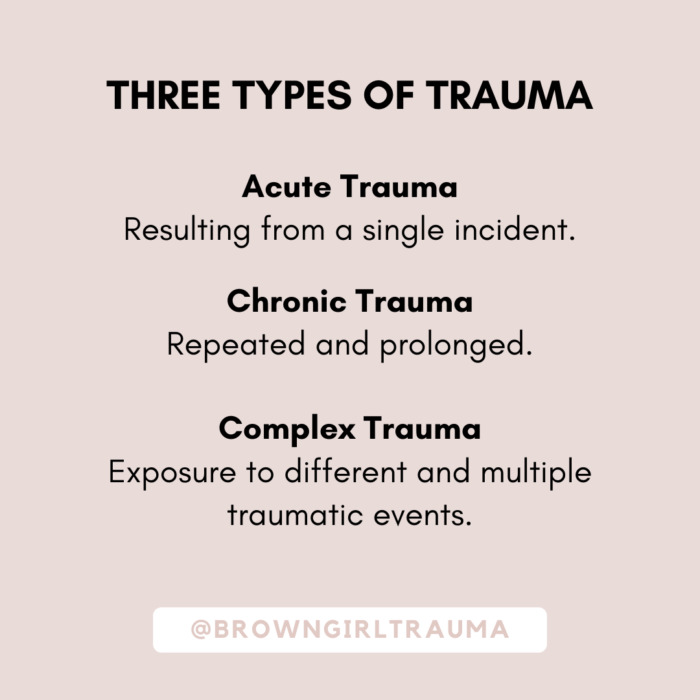
Causes Of Emotional Trauma
Many different causes of emotional trauma exceed a person’s ability to cope. It may include but isn’t limited to abuse, natural disasters, silent treatment, one-sided emotional eruptions, or sudden loss of a loved one.
An important thing to note here is that the cause can result from both visible and invisible sources. The non-visible sources can be just as impactful in causing emotional trauma.
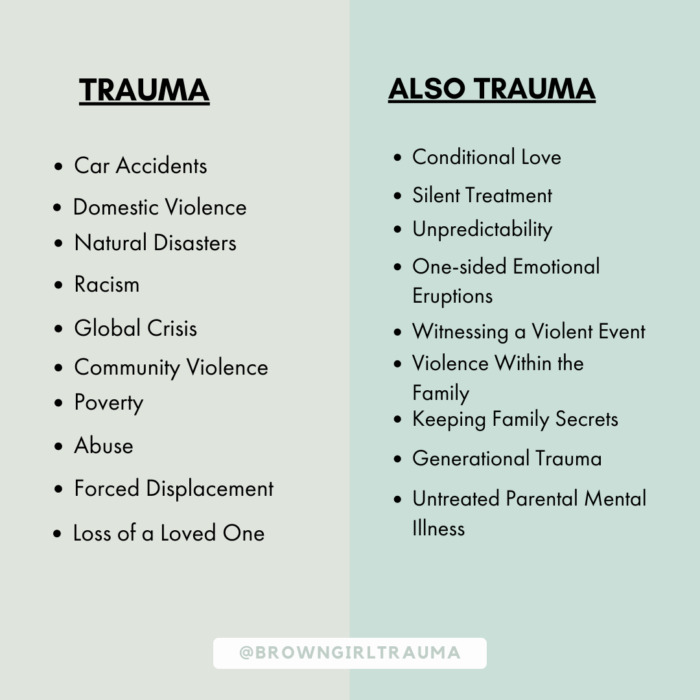
Signs of Emotional Trauma in Adults
Common effects of emotional trauma may include but are not limited to:
- Anxiety
- Depression
- Flashback to memories of similar experiences
- Isolation
- Anger or irritability
- Confusion
- Fearfulness
- Nightmares
- Fatigue and/or muscle tension
- Feelings of grief
- Difficulties making decisions
- Difficulty with concentration
- Sleep challenges
Work with a trained mental health therapist to learn more about your traumatic events, emotional trauma symptoms, and ways to cope with them. Seek the advice of your doctor or mental health professional first. This post is not meant to replace their treatment and recommendations.
How to Recover From Emotional Trauma?
1. Physical movement
Movement is a great way to soothe your nervous system. It releases endorphins and allows you to focus on the sensations of your movement, creating safety.
- 3-4 days 30 minutes of jogging, walking, dancing, lifting
- Yoga
- Focus on your body sensations and breathe
2. Identify your emotional trauma triggers
Identifying your emotional triggers can help you understand your mental health and productively manage your emotions.
Tips for identifying triggers:
a) Journaling
- Next time ask yourself, what just triggered me? To identify triggers, you can look into any vulnerability factors impacting your anxiety. Examples of vulnerability factors include illness, hunger, lack of sleep, drugs and/or alcohol, or lack of movement.
- Next, think about the prompting event, aka what happened or was going on right before you got anxious. Prompting events include internal and external events. Internal prompting events include thoughts, emotions, behaviors, and/or physical sensations. The external prompting includes your environment.
b) Working with a therapist
A therapist is a trained mental health professional who can help you identify what your triggers are. You may not have the necessary tools required, but your therapist will.
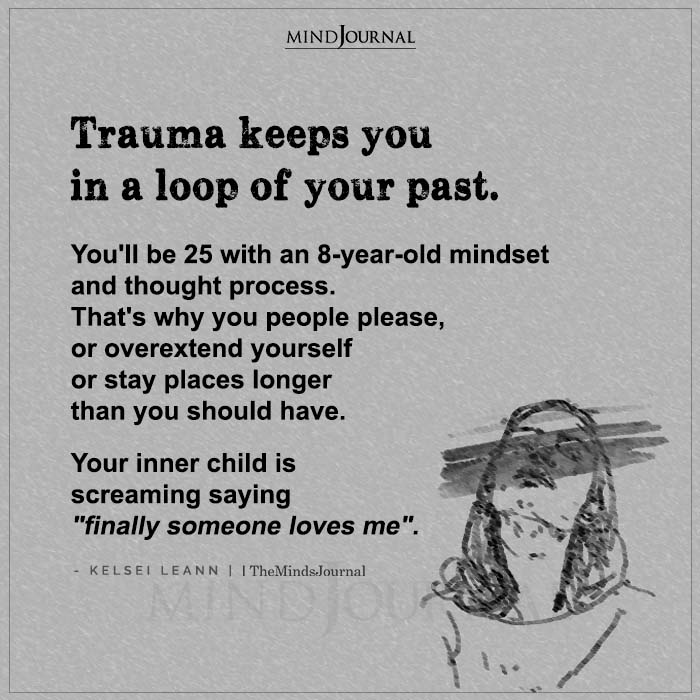
3. Journaling about your emotional trauma
Regular journaling practice can help track your emotions and better understand your patterns and trauma. You can add it as you work through your emotional trauma.
The beauty of journaling is that there is little you need to get started, and it has tremendous benefits.
Related: 20+ Signs Of Emotional Trauma In Adults You Might Not Recognize
4. Practice emotional self-care
Self-care is improving and maintaining your physical, emotional, mental, and spiritual health. It allows you to prioritize yourself and focus on your needs.
Read Self Care Routine to get a few ideas.
5. Mindfulness
More and more research shows the benefits of regular mindfulness practice. For example, research has shown that an eight-week mindfulness practice can help shrink your brain’s fight or flight region, which is your amygdala.
2 exercises to practice to soothe your nervous system:
1) Grounding Exercise: Connecting with your surroundings is a way to regain control and help detach yourself from the emotional pain you may be experiencing. Name five things around you, name four things you can touch, name three things you can hear, name two things you can smell, and name one thing you can taste.
What’s the 333 rule for anxiety? Name three things around you, three things you can hear, and move three body parts.
2) Mindful breathing: Try the 4-7-8 breathing technique, the box breathing (YouTube), or belly breathing to calm yourself.
6. Engage in a creative activity
Expressive arts, music therapy, art therapy, etc., are all rising ways of coping with trauma. You don’t have to be limited in how you express your emotions.
Finding a creative outlet that you resonate with can be highly therapeutic.
7. Seek support
It takes strength to ask for and accept help. We are a collectivistic community that prides itself on being there for others when they need it- even if they may not understand how to support you initially.
Addition places of support: mental health therapists, friends, family, support groups, coworkers, online outlets, etc.
12 Reasons People Don’t Talk About Their Emotional Trauma
1. The dysfunction was normalized.
During one of our sessions, my therapist asked me, ‘when did you realize that you were living in a dysfunctional house?’ I didn’t answer right then, but when I went home, I thought about it. Abuse, neglect, and household dysfunction were extremely normalized when I was growing up.
Most families around us had similar patterns, so I never questioned it. It was just our normal. It may be your normal.
As the famous saying goes- the body always keeps a score. So likewise, your body maintains a score of the emotional trauma you experience.
Some common emotional trauma symptoms are difficulty concentrating, depression, withdrawal/isolation, shame, sleep disruptions, anxiety, getting flooded easily, hyper-vigilance, flashbacks, and self-destructive behaviors (this list is not exhaustive).
If you are newer to understanding trauma, emotional trauma might be something you are reading about for the first time.
When your experiences are not validated or normalized, it can be hard to talk about your emotional trauma. However, as you continue to share your story, you will realize that abuse, neglect, and household dysfunction are not normal but rather traumatic experiences.
Reflection:
- What is your definition of a healthy family?
- What types of families are you surrounded by, or were you surrounded by?
- Does your own family reflect the same patterns?
- What are those patterns, and are they consistent with your definition of a healthy family?
2. You were taught to put other people’s needs before your own.
‘I will get to it,’ ‘what is the point of talking about it now, ‘my parents will fall apart,’ ‘what will people say, ‘it’s not trauma,’ etc. are all things you may have told yourself to put the needs of others before yours.
We have an ingrained culture that demands women place others before themselves. If you look at your generational history, women have repeatedly been victims of sexism and patriarchy. Yet, women in our community have adhered to these expectations without questioning them for years.
They never stopped and asked (or were asked) what they were feeling or what they needed. They were just placed on this pedestal of life and tangled in the obligation of serving others.
The women in your family may not have the emotional language to understand that taking care of themselves first is okay and that pouring from an empty cup does not help anyone.
Also, there might have been consequences of putting your needs first, which limits a person’s ability to prioritize their needs. A community that values a frequently self-sacrificing woman makes sense, then, if you don’t prioritize your emotional trauma symptoms.
You can value being a collectivistic community AND consider your needs. Your value is not determined by the sacrifices you make.
Reflection: What message did you receive from your family about prioritizing your needs? Do you know what your basic needs are? Do you know how to engage in a self-care practice? How do you put yourself before others, and how does that feel? Were there any consequences?
Related: The Reason Emotional Trauma Doesn’t Heal and How to Overcome It
3. You were told you were ‘crazy,’ ‘too emotional,’ or ‘seeking attention.’
This one is still prevalent in the South Asian community. If you may have even tried to talk to someone about what you were feeling, you may have been told these things-
- She is crazy.
- You are too emotional.
- She is seeking attention again.
- It is all in your head.
- She is possessed.
- We never experienced this during our times, why is your generation so weak?
When someone goes through a traumatic event, invalidating comments is the last thing they need to hear. Just because you do not understand something does not mean it is not a reality for someone else or is wrong.
The mental health stigma increases when we label people with these harmful tags. You start to question yourself and think, ‘maybe I am crazy, or ‘perhaps I am too emotional. This teaches you to suppress how you feel and not trust yourself.
I am here to remind your experiences are valid, and I believe you! It is not uncommon to have trauma symptoms if you go through a traumatic event.
I think we have started to scrape some of the stigmas in our community as more people in our generation are speaking up about their traumatic events and fighting to reduce the stigma. However, there is still a lot of work to be done.
Reflection: When you first shared your story, what were the responses you received? Does that play a role in how you choose to show up with your story today?

4. You think no one will understand.
The dysfunction can seem so normal when you are surrounded by it. However, we only know what we are exposed to; if dysfunctional patterns are all you have seen, then that is what you will know.
When I first started experiencing emotional trauma symptoms, I had similar thoughts. Firstly, I did not have the words to explain what I was experiencing, and even if I could formulate a sentence, who would I talk to?
The fear that no one will understand is paralyzing. Many cycle breakers in this community have reached out in tears to normalize their experiences. It is like a breath of fresh air to realize you are not alone in your experiences; some people do understand.
If you are someone who thinks no one will understand, please visit Brown Girl Trauma Instagram, and you will find an entire community that stands with you.
Only some understand your experiences, and that is okay. Sometimes people need to learn how to respond. That is okay. You find a community that you know will understand.
Reflection: Do you feel like you are alone? Who are some of the people you think you may feel comfortable sharing your mental health thoughts with?
5. You grew up silently watching your own mom.
Growing up, I always watched my mom (or whoever your guardian was) get sidelined regarding anything related to her. I have never seen her ask for something she emotionally needed. I never saw my dad ask her anything, either.
That was just how things were, and those were the patterns I picked up for myself too. Year after year, I watched my mom silently live with her experiences. Then she would show up for everyone as if nothing happened.
When we think of immigrant parents, we don’t realize how much trauma their bodies carry. It does not excuse their behavior but allows room for empathy.
My mom never asked because prioritizing others and their needs were normalized, and my dad never asked or talked about his own emotions & experiences because that wasn’t how he was raised.
You must reflect on your parent’s patterns because you will appear similarly in your relationships if you don’t. Hiding your emotional trauma symptoms does not help anyone, especially you.
Reflection: Reflect on your generational history and how the women in your family have dealt with their trauma. Now reflect on your patterns. Are you repeating the same pattern for yourself?
6. But what will people think?
I am sure many of you have heard this statement before.
- Dress appropriately, or what will people think?
- Refrain from speaking loudly or what people will think.
- Keep your mental health struggles to yourself, or what will people think?
- You can only move out of the house after you are married. What will people think?
The list can go on and on. So many of us haven’t pursued careers, relationships, adventures, or therapy because of this statement. Topics like depression, anxiety, PTSD, etc., are not something that is not talked about.
You might not care what other people think, and maybe your family does. This can be another reason many people do not talk about their trauma. Instead, tactics like guilt-tripping, shame and silent treatments are used to silence your story.
In these situations, it is important to have a safe space like therapy to reflect on these tactics and the harm they cause.
People will talk regardless, so try to look past this idea of what people will think. Anything that comes at a cost to your mental health cannot and should not be worth it.
Reflection: Do you care about what people think about your mental health? Whose voice are you hearing when you think about talking about your experiences? Is it your voice or someone else?
Related: The One Thing Critical To Successful Healing From Emotional Trauma
7. You may have been taught that love means your ability to tolerate.
This is also prevalent in our community, especially for women. How often have you heard people say, ‘women are more tolerant, ‘women should compromise because men are weak,’ a woman’s responsibility is her family first,’ and ‘people get mad at those they love the most. These are dangerous and harmful ideas.
You may have chosen to tolerate the emotional pain when you think about your trauma symptoms. The more you accept, the stronger you look (in our community, at least).
However, tolerating something at the expense of your mental health is not worth it. You deserve to be heard and validated for your experiences.
Love does not mean your ability to tolerate it. Not tolerating it does not mean you don’t love the person.
Reflection: Do you believe that love means your ability to tolerate it?
8. You don’t know where to start.
You may know that what you are experiencing is a result of your traumatic experience(s), but you don’t know where to start.
When I first experienced anxiety, I did not know that is what it was called. I just knew I had a racing heart, extreme worry, inability to focus, and restlessness. We lived in a small village in India where I had never heard of mental health or mental illness.
So I went to our village doctor, who dismissed us, saying that this was common for my age and that it would get better. Now mind you, we believed this doctor, and I just waited for someone who wasn’t trained to support their patients mental health needs.
Of course, it did not just go away on its own. When I moved back to the United States, my high school counselor was the first to use anxiety and depression. Knowing there was a name for what I felt meant there was help.
If you need to know where to start, therapy would be the first place to look. Call your local clinics to see if they have consultations available.
Most of the time, consultation is free as we want to know if it would fit our mental health needs. They have resources to direct you to what’s next if therapy isn’t an option.
If you do not have therapy clinics, use social media communities. So many incredible accounts help people get started on their healing journey.
Reflection: What resources do you currently have at your exposure? (This could be friends, family, community resources, etc.) Can you start there?

9. The culture of silence.
We have a culture of silence- that is no secret. Abuse, neglect, and household dysfunction are brushed under the rug. Most of us have a more challenging time realizing that we were raised in a dysfunctional environment.
You grow up watching everyone in your community hiding taboo things, and we celebrate something that brings honor to our family. It is normal to feel that our trauma symptoms need to be silenced.
This could not be further away from the truth. We have to break the culture of silence and talk about these issues because it determines the course of our life. It should matter.
Reflection: How does your family/community reflect the culture of silence? How does that impact the way you talk about your experiences?
10. You think you need to go through it alone.
As someone who has practically raised themselves emotionally, you may think you must go through it alone. Maybe you feel guilty about what happened and are trying to rationalize it by putting only yourself through the painful feelings.
But, on the other hand, you may be in a space where you cannot talk about what you are going through, which means you must go through it alone.
Through the power of social media, we have found people worldwide connected with the Brown Girl Trauma community. This past year thousands of people realized they were not alone in their experiences. That is a powerful realization.
If you are going through it alone, I hope you find comfort in knowing there is an entire community that stands with you.
Reflection: Do you have a community where you feel like you belong? If your answer is no, challenge yourself to find 1-2 communities with which you may connect.
11. What’s the point of talking about something that passed?
As a trauma survivor, you may have had thoughts like ‘what is the point of talking about something that has passed?’, ‘will talking about the trauma take you back in time when it never happened?’, ‘Does it fix anything?’ etc.
Speaking from personal experiences, talking about our traumatic experiences can be extremely painful as it requires us to relive those moments again.
Firstly, this is why it is SO important to make sure you are processing this with a professional who can offer you a safe space and guide you through reliving it in a way that helps you know you are not alone at that moment.
Secondly, talking about your trauma symptoms is essential. It enables you to understand where these symptoms stem from and make sense of what happened.
Talking about our traumatic experiences can help you debunk some mistaken beliefs you adopted to survive. But, most importantly, the biggest reason to talk about something that passed is to realize that you are more than your trauma.
Reflection: Journal why you may not want to talk about your trauma symptoms or mental health in general.
Related: 10 Lasting Effects Of Emotional Abuse That Inflict Deep Trauma
12. You may not realize your emotional trauma symptoms are a response to your traumatic event.
The experiences you go through might have been so normalized that you don’t even realize they are traumatic. When I first started experiencing my trauma symptoms, it never occurred to me that it was a response to the traumatic events I was going through.
It never occurred to me that my body kept a score of chaos, unpredictability, and emotional abuse.
Emotional trauma from parents can go unnoticed when the behaviors are normalized. Listening to your body is so important and takes practice. It is where all the answers lie.
Reflection: Journal your trauma symptoms. When do you experience them the most, and when do you experience them the least? Do this for several weeks to find patterns.
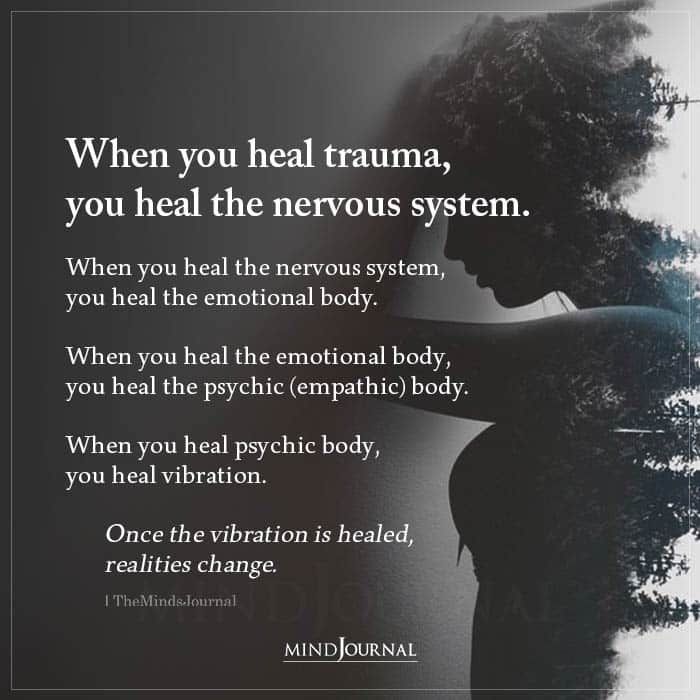
Let’s Recap…..
Talking about our traumatic experiences is hard- I understand that completely. However, when you repress your trauma, it does not just go away. Instead, it gets stored in our bodies. This is why it can be helpful to reflect on why you don’t talk about your emotional trauma and understand the impact it has on your life.
Giving up on yourself is not an option.
You deserve to be heard.
You deserve to live a life that is thriving and not just surviving.
Rooting for you, always!
What are some reasons you choose not to talk about your emotional trauma?
Written By Nisha Patel
Originally Appeared On Brown Girl Trauma
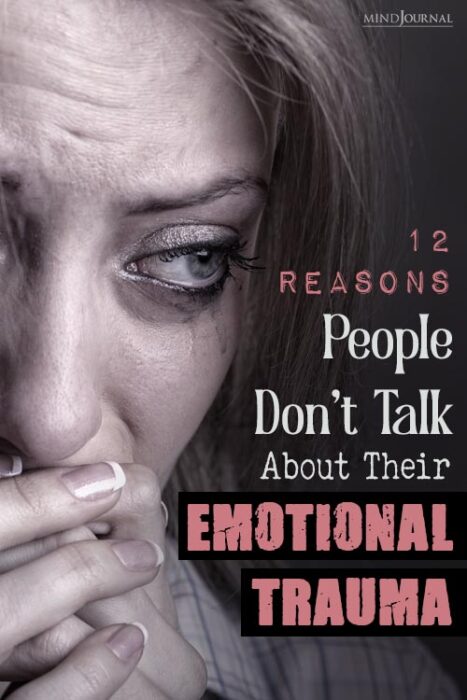
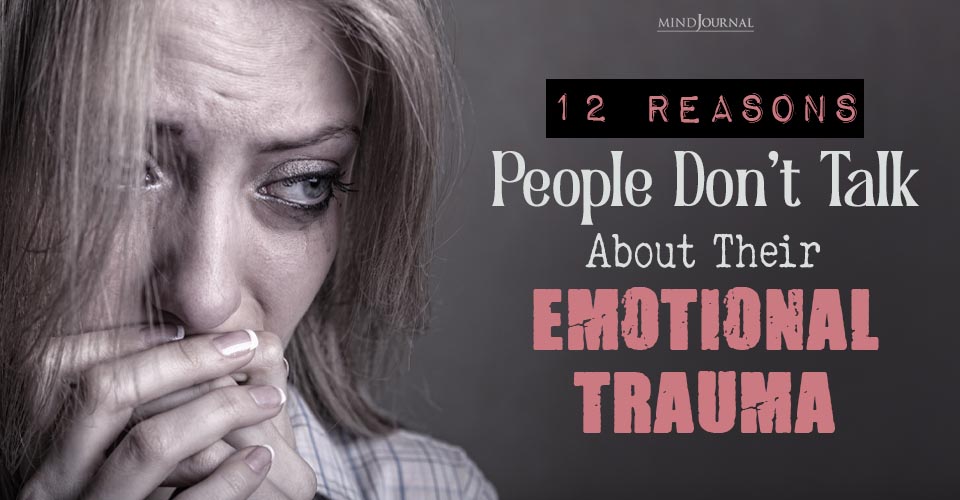












Leave a Reply
You must be logged in to post a comment.